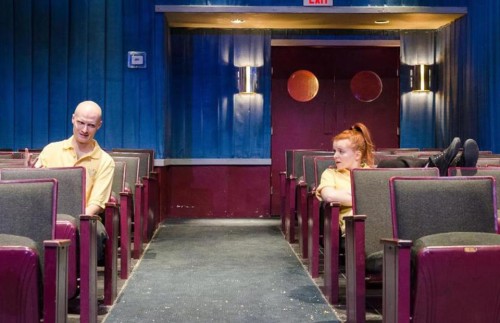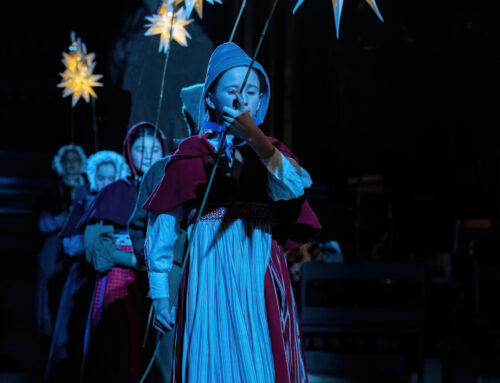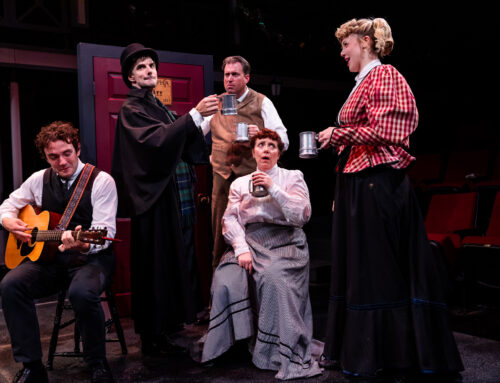THE FLICK is set in a movie theater and when the movie’s over, that’s when the real show begins. It’s not just ingenious—it’s brilliant. THE FLICK — which won an OBIE for its talented playwright and cinephile Annie Baker–is here mounted by Company One and has to be one of the most offbeat and illuminating plays ever staged anywhere, and one of the most exceptionally well-acted productions of the season.
As you seat yourself in Suffolk University’s intimate Modern Theatre before the play starts, you find yourself facing rows of seats—facing you –in a movie theater! In other words, you are sitting where the screen would be (so we are the movie?), looking out at a sea of empty seats, the projection booth visible high up on the back wall.
Suddenly, I am where I always want to be in a theater: in a new place, ready to see things from a completely fresh perspective. As the play begins, the lights go down and movie music comes up; shadows flicker as though from the movie on the screen behind us. As the music ends after what apparently were the closing credits of a film, the lights come back up and two employees enter from the rear of the movie theater and begin cleaning up after the show.
They are Sam—a 35 year old white dude wearing a baseball cap and for whom cleaning the nacho machine is a pivotal moment. Alex Pollock has reached some kind of thespian apotheosis in this role. It’s a crazy, visceral performance– that of an overgrown boy who is emotionally constipated with sudden bursts of apoplexy. He’s the kind of guy who thinks the name “Tiler” with an “i” is “so cool.”
Then there’s Avery –Peter Andersen– perfect as a be-spectacled, self-conscious, black,college-age movie geek who’s being trained his first day on the job by Sam. And filling out the triad is the projectionist, Rose–Brenna Fitzgerald– a feisty, wild-haired realist (reelist!) who may or may not be a lesbian, but whom Sam has the hots for. As he stands below the projection booth window, staring up her and bellowing “ROOOOOOSE,” he’s a 21st century Stanley to her Stella. But is his hankering for her merely primitive or just unfounded? In a pivotal moment, Rose—dares him to look at her, actually see her—and he cannot. Later she discovers that Avery is somewhat beyond her “grasp” as well.
The conversations among these three are miraculous—uncannily authentic and believable, but also mysterious like a portal to some existential Bermuda triangle where the long spaces between the lines suck you in as much the words themselves. Baker’s script, skillfully guided by director Shawn LaCount and executed by this extraordinary cast, have given rise to a potent breed of pregnant pause. Hilarious ironies and non-sequitors, painful absurdities, heartbreaking revelations, and most of all the truth of what is unsaid– continually erupt as the three try to communicate about sex, relationships, skin rashes, movies, aspirations, and the eventual ethical dilemma.
Sam and Avery banter about cleaning up the littered theater, a repository of not just the usual spilled popcorn and soda, but sometimes the disgusting detritus that human beings leave behind: a dirty old sneaker, a pile of chocolate tapioca pudding, and much much worse. Avery confesses that he’s very uncomfortable with real life, that he’s “shit-phobic… Other people’s shit makes me want to puke.”
It’s superficially hilarious –but leads us right to the heart of this play: the challenges of intimacy and communication, and beyond that identity, reality, and fantasy. These are especially troublesome issues for the Hamlet-like Avery—an intellectual from a broken home who can’t get past the idea that everyone including himself is acting a role. He worries that the 35 millimeter truth is disappearing from an increasingly intangible digital world. Movies for Avery are more real than his life; they are his bible too. His response to the aforementioned ethical dilemma is a quote from Ezekiel– by way of Samuel L. Jackson in PULP FICTION. And he’s a wiz at tracking the “six degrees of separation” between wildly different actors through their varying movie roles (he can actually link actors as dissimilar as Pauly Shore and Ian Holm—absurd and true!)
This may ultimately be re-assuring for him and for us. Like actors living in our individual movies/dramas—we may all very well be connected, no matter how different our stories, and how farfetched and circuitous the route. Annie Baker has offered a new lens through which to see ourselves and each other– perhaps by looking through the fictions we create.
THE FLICK flipped me out. It’s three hours long—you might want to bring a snack but try not to leave a mess behind. Yes. I am one of those people who sneak food into theaters. But food or no food—you won’t go hungry at THE FLICK. By Company One through March 15 at the Modern Theatre.







Leave A Comment
You must be logged in to post a comment.